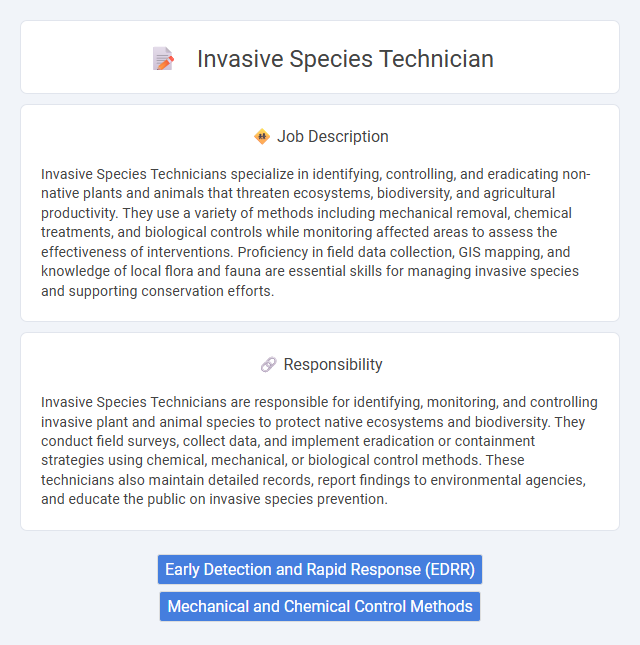
Invasive Species Technicians specialize in identifying, controlling, and eradicating non-native plants and animals that threaten ecosystems, biodiversity, and agricultural productivity. They use a variety of methods including mechanical removal, chemical treatments, and biological controls while monitoring affected areas to assess the effectiveness of interventions. Proficiency in field data collection, GIS mapping, and knowledge of local flora and fauna are essential skills for managing invasive species and supporting conservation efforts.
Individuals who enjoy working outdoors and have a strong interest in environmental conservation are likely to find the role of an Invasive Species Technician suitable. Those comfortable with physically demanding tasks and able to work in various weather conditions may have a higher probability of success in this position. People with attention to detail and a commitment to ecological health might also be better suited to handle the responsibilities effectively.
Qualification
Invasive Species Technicians require knowledge in environmental science, biology, or natural resource management, often supported by a bachelor's degree in one of these fields. Practical experience with field data collection, species identification, and habitat assessment is essential for effective invasive species control. Certifications in pesticide application and familiarity with GIS technology enhance job performance and compliance with environmental regulations.
Responsibility
Invasive Species Technicians are responsible for identifying, monitoring, and controlling invasive plant and animal species to protect native ecosystems and biodiversity. They conduct field surveys, collect data, and implement eradication or containment strategies using chemical, mechanical, or biological control methods. These technicians also maintain detailed records, report findings to environmental agencies, and educate the public on invasive species prevention.
Benefit
An Invasive Species Technician is likely to benefit from valuable hands-on experience in ecological management and restoration, enhancing their expertise in identifying and controlling non-native species. This role probably offers opportunities for outdoor work, contributing to environmental conservation efforts that can be both rewarding and impactful. Career advancement in environmental science or natural resource management fields is also a potential benefit of gaining specialized skills in invasive species control.
Challenge
The role of an Invasive Species Technician likely involves significant challenges due to the constant need to identify, monitor, and manage rapidly spreading invasive species in diverse environments. Difficult terrain and unpredictable weather conditions may complicate fieldwork, increasing the physical and logistical demands of the job. There is probably a continuous pressure to balance effective eradication efforts with minimizing harm to native ecosystems, making strategic decision-making essential.
Career Advancement
Invasive Species Technicians play a critical role in managing and eradicating non-native species, gaining specialized expertise in environmental science and fieldwork. Career advancement opportunities often lead to positions such as Environmental Specialist, Project Manager, or Conservation Scientist, where advanced skills in data analysis and ecological impact assessment are essential. Gaining certifications in invasive species management and participating in collaborative research projects can significantly enhance professional growth within this field.
Key Terms
Early Detection and Rapid Response (EDRR)
Invasive Species Technicians specializing in Early Detection and Rapid Response (EDRR) play a crucial role in preventing the establishment and spread of invasive species through vigilant monitoring and prompt action. Their expertise enables the identification of emerging invasive threats at initial stages, allowing for immediate containment or eradication efforts that protect native ecosystems. Proficiency in using advanced field survey techniques and data management tools is essential to support timely decision-making and effective response strategies.
Mechanical and Chemical Control Methods
An Invasive Species Technician specializes in mechanical and chemical control methods to manage and eradicate non-native plants and animals disrupting ecosystems. Mechanical control involves manual removal techniques such as cutting, mowing, and uprooting invasive species to reduce their spread and impact. Chemical control employs targeted herbicide or pesticide applications designed to minimize harm to native species while effectively controlling invasive populations.
 kuljobs.com
kuljobs.com